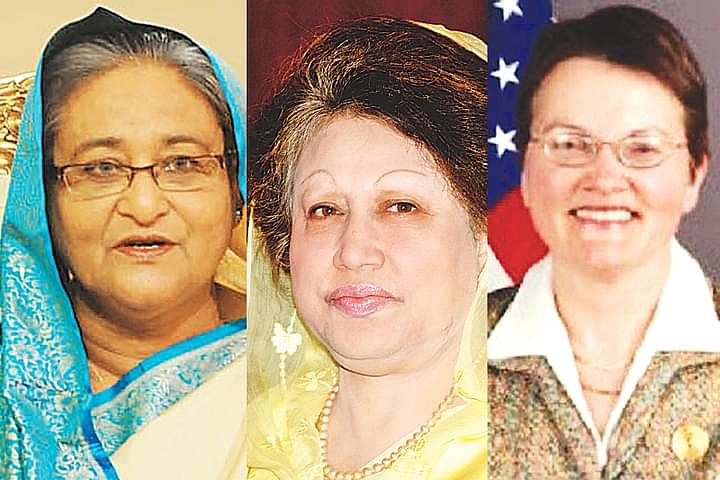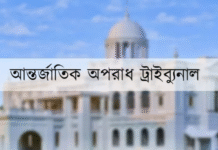
Ruling Awami League leaders and ministers say that as BNP had failed to make any headway in its movement, its leaders are rushing to foreign diplomats for support. Running after foreign diplomats with our country’s problems is nothing to be proud of, though in the past, leaders of both Awami League and BNP have appealed to foreigners to place them in power or keep them in power.
We remember only too well the ‘failed dialogues’ of the Commonwealth representative Sir Ninian in the mid-nineties and the UN assistant secretary general Fernandez-Taranco in 2013. The first dialogue was when BNP was in power, and the second was during the rule of Awami League. But it was in the eighties that this trend to approach foreigners began.
Previously, the politicians would approach the foreign diplomats behind the scenes. When Wikileaks flashed secret reports of various countries in 2010, details were revealed of which politician visited which diplomat and where. The advice given by the diplomats were also revealed. Prothoma Prokashon in 2013 published a book, ‘Wikileaks Bangladesh,’ with translations of many wires sent from the US embassy in Dhaka to Washington during the 2008 state of emergency. These wires revealed that leaders of Awami League, BNP, Jatiya Party and Jamaat-e-Islami, the parties that had been in power at various times, would regularly have meetings with the diplomats of powerful countries.
Bangladesh Protidin recently published an interview of former US ambassador Patricia Butenis. I don’t know how the political leaders will take it, but as a citizen, I am ashamed. The conflicts among the politicians, the inter-party conflicts and the intra-party clashes did not escape the eyes of the diplomats. Just a few years ago, a foreign magazine carried a juicy headline on Bangladesh politics – ‘Battle of the Begums.’
Newspapers and the social media have ample proof that political fracas in Bangladesh is not restricted to the two parties or the two leaders. One leader releases a volley of vitriol against another, one organisation is on the warpath with another and they all quite openly castigate and abuse each other. One has no alternative but to turn a deaf ear to the unsavoury statements that took the social media and political arena by a storm recently over the sculpture issue.
There will naturally be differences, debate and a conflict of ideology in politics, but why should the language be so offensive? Why should a politician or a religious leader resort to abusive language when criticising the opponent? When people lose their power of reasoning and common sense, they become overtly vocal. When logic and ideals are in the forefront, then there is no need for abusive words.
She (Butenis) and Anwar Chowdhury met with Sheikh Hasina on 6 January. They informed her that certain top ranking Awami League leaders had come to them with suggestions that Sheikh Hasina and Khaleda Zia be exiled abroad and also suggested military intervention
In his speech of 7 March 1971, Bangabandhu Sheikh Mujibur Rahman protested in strong language against the oppression, repressing and killing by the Pakistan rulers. In his 18 minute speech, he detailed the 24 years of history about how the Bengalis were deprived, he spoke of how to face the enemy and gave directives to the people. But not a single of his words were objectionable or hurtful.
Back to the Patricia Butenis issue. From 13 April 2003 to 23 June 2007 she had been on diplomatic posting in Bangladesh. That was from the tail end of the BNP-led four-party rule up till the first few months of the military-backed caretaker government.
In a recent interview with Charles Stewart Kennedy of the US Association for Diplomatic Studies and Training’s Foreign Affairs Oral History Programme, Patricia Butenis said that her time in Bangladesh had been wonderful. She praised the people of Bangladesh, but said she could not do the same about the politicians of Bangladesh. She said that the activities of Bangladesh’s politicians were an embarrassment for her. They all wanted to involve her in politics. (Bangladesh Protidin, 23 December 2020)
Butenis said leaders of various political parties would contact her and would want some form of support and assistance from her. This did not happen in all countries. She said that they would even tell her to convey messages to the prime minister or to the opposition. She said her predecessor Harry Thomas had said that the US ambassador in Bangladesh was a king.
The ambassadors of other countries too imagined themselves to be kings in Bangladesh. It is our politicians who gave them this attitude.
According to the book ‘Wikileaks Bangladesh,’ in a wire of 7 November 2006, Patricia Butenis had written that she (as ambassador) and her political officer had met with the chief election commissioner MA Aziz and advised him to resign. But Aziz had been determined to cling on to his office.
The wire of 10 December said that ambassador Butenis and the British high commissioner Anwar Chowdhury has called upon Awami League president Sheikh Hasina to create an understanding attitude so as to end the stalemate created over the election. The next month they met her again as well as BNP chairperson Khaleda Zia.
In the wire of 7 January, she wrote that she and Anwar Chowdhury met with Sheikh Hasina on 6 January. They informed her that certain top ranking Awami League leaders had come to them with suggestions that Sheikh Hasina and Khaleda Zia be exiled abroad and also suggested military intervention. The two diplomats had hoped for bold steps by the two leaders to end the stalemate. The wire said that Awami League at the time has even called for elections to be conducted under UN supervision. In 2013 BNP had made the same demand.
The wire of 9 January said Butenis met with former president Ershad on 8 January at his request. Ershad had proposed a national coalition government backed by the armed forces in order to resolve the stalemate. But the ambassador said that her country was opposed to the unconstitutional role of the armed forces.
The 30 May wire sent by Butenis said Khaleda Zia had requested her to help her sons Tarique and Koko.
The Wikileaks’ wires also revealed that certain leaders of both the parties had tried to get close to the leadership of the army-backed caretaker government after it was established. Some even tried to form a ‘King’s Party’, though the attempt failed. Then Awami League came to power in the 2008 election.
I do not know how the Awami League and BNP leaders will take the former US ambassador’s words. She made quite strong comments about Bangladesh’s politicians, from her experience before and after 1/11. She expressed her dislike as far as diplomatic decorum allowed. It has been 12 years since then, but have our politicians managed to change themselves at all?
Sohrab Hassan is joint editor of Prothom Alo and a poet. He can be contacted at sohrabhassan55@gmail.com. This report appeared in the print and online edition of Prothom Alo and has been rewritten for the English edition by Ayesha Kabir









